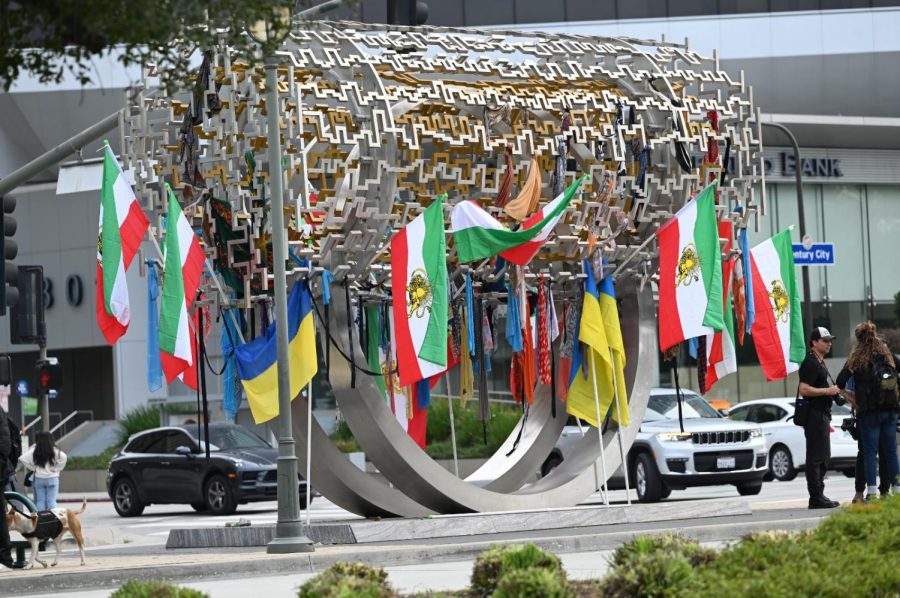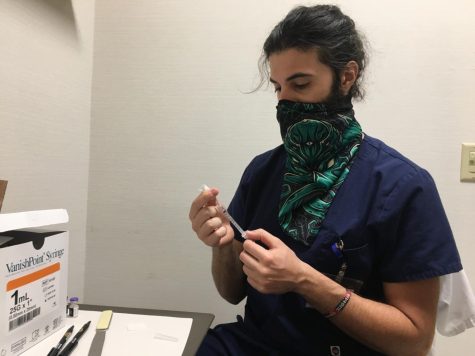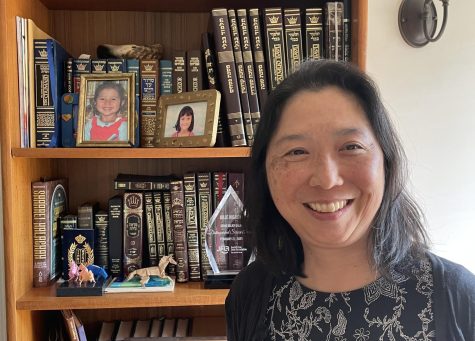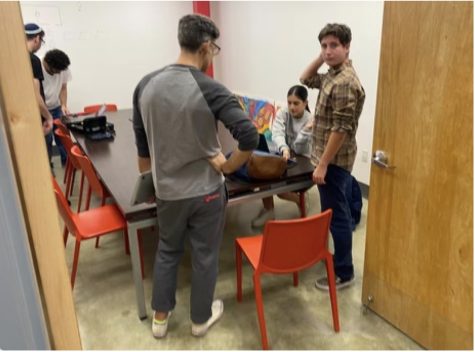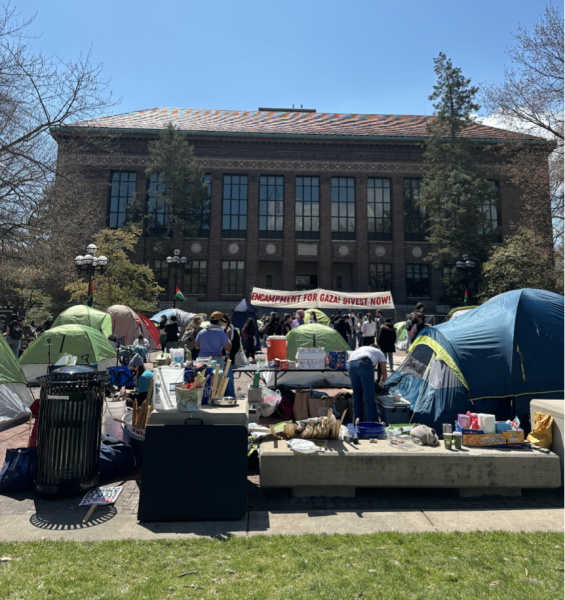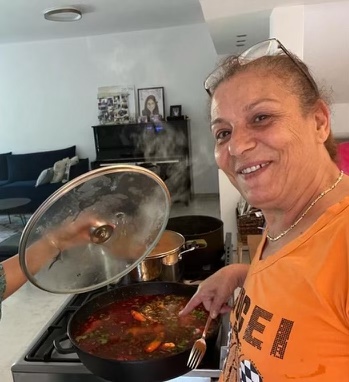Death of Masa Amini in Iran not a surprise to Iranian-Americans at Shalhevet
Outpouring of rage at government is reacting to decades of injustice, students and teachers say
MONUMENT: Protesters at a Jan. 8 gathering at Century City’s “Freedom Structure” art installation draped it with hijabs along with Iranian and Ukrainian flags.
Shalhevet senior Hannah Nili was not the least bit surprised when she heard the news last fall that Iranian dissident Masa Amini had died in police custody in Iran on Sept. 16, news which sparked worldwide street protests and made news headlines for weeks.
Ms. Amini, 22, was visiting Tehran when she was arrested by Iran’s “morality police,” a unit of the country’s police force that enforces Islamic dress laws, for wearing her hijab improperly in public – an offense punishable by imprisonment or lashings.
She died in custody three days later, and while the Iranian government claims that she died of heart failure, Amini’s family blames Iranian law enforcement for her death.
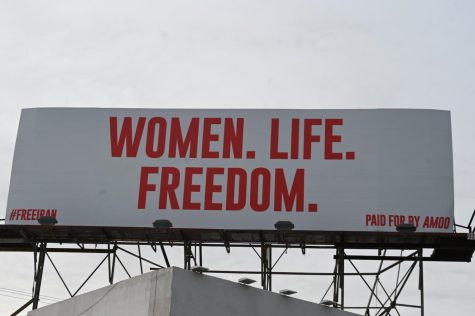
Hannah said she’d heard about a lack of justice within Iranian law enforcement from her parents since she was young. Both of her parents were born and raised in Iran, and her Dad is from Saqqez, Ms. Amini’s hometown, located in Iranian Kurdistan.
“People were very surprised about this information, but Persian people who have known this stuff was going on, they were just like, it’s about time that this is being released into the world,” said Hannah in an interview.
“It’s about time other people are understanding what is going on in that country,” Hannah said.
In Iran, protests began immediately in Saqqez and quickly spread to university campuses and cities all over Iran. Protests included women removing and waving their hijabs and chanting slogans like “Women! Life! Freedom!” and ’’We will fight and take Iran back!” according to media reports.
After nearly three months of violence and civil unrest across the country, a senior Iranian official announced Dec. 4 that Iran would be abolishing its morality police.
However, some media reports say that the morality police simply stopped patrolling in the capital city of Tehran, and have moved outside the city.
Since the unrest in Iran began in September, at least 527 protesters have been killed, and over 19,600 people have been arrested, according to media reports as of Feb. 5.
The situation of Iranian citizens reported by worldwide media are not foreign to many Shalhevet faculty members and students.
In fact, it’s the reason that they themselves, or many of their family members, left Iran in the first place.
The parents of Shalhevet senior Josh Z. (not his real name), left Iran during and after the revolution, his father in 1979 to escape mandatory enlistment into the Iranian military. His mother left in 2000 in search of new opportunities in America, but also because of the persecution she faced there as a Jew.
Josh requested only to be called by his first name so as to conceal the identity of his grandparents and family in Iran. His grandparents stayed behind and are still living there.
For their protection, Josh also would not say where they live in Iran, but said they have seen the recent large, and often violent, protests first-hand.
He said they are safe but have experienced changes in their day-to-day life since the recent surge in protests.
“They are pretty scared to leave the house,” said Josh.
Many of his family members who have immigrated from Iran faced discrimination from Iranian police when they lived there. For example, his mother was once confronted by an Iranian policeman for wearing her head covering improperly.
“My mom, when I believe was 16 or 17 – around my age – was walking around in the city and she had sort of a small head covering…,” said Josh. “The cops sort of came and grabbed her hair and sort of cut it off and threw it back to her and told her ‘now you’re good.’”
Shalhevet Math teacher Mrs. Tamara Gidanian also faced persecution from the Iranian government. She still follows the news about what’s happening there, as it’s where she was born and lived for more than 30 years.
“It is my country,” Mrs. Gidanian said, “and I still have a feeling for my country and for my people who are living in that country.”
She immigrated to America in 1990, 11 years after the revolution. And although she didn’t feel much discrimination as a woman in Iran, she said she did feel it as a Jew.
When Mrs. Gidanian wished to complete her master’s in physics, she was told she could not because she was Jewish.
She was not allowed to teach in universities, she said, and was treated differently from other teachers in her role as a high school teacher.
“In many of those high schools, they actually kind of –I don’t want to say they bothered me, but they questioned me,” she said. “About the work that I would do in my job, [and] about being Jewish.”
Eleven years after the revolution, she left.
The mother of junior Shira Elyaszadeh experienced similar things to Mrs. Gidanian when she lived in Iran, where she was born and raised.
“There’s a lot of Jewish discrimination that my mom faced,” said Shira. “My mom was in a college program in Iran but she wasn’t able to graduate because she was Jewish. So she had to move basically because she noticed that there was no future for her.”
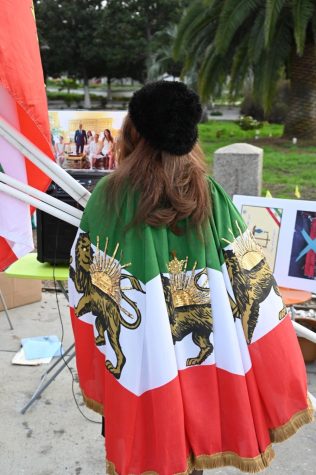
Mrs. Gidanian said that although she is glad to see action being taken by the Iranian people against the current regime, that this action – and maybe an eventual change – all come at a great cost.
“I am not happy,” Mrs. Gidanian said, “because a lot of young people are dying, and they are killing a lot of young people, and I am really, really upset about that.”
The current Islamic Iranian regime came to power when Iranian citizens overthrew the authoritarian and U.S.-supported Reza Shah Pahlavi through mass uprisings in 1978 and 1979.
The Shah fled Iran in 1979, and Ayatollah Ruhollah Khomeini became Iran’s Supreme Leader, declaring it an Islamic republic.
Iranian revolutionists protested the Shah’s western affiliations and secular-run government and in 1979, militant Iranian fundamentalists took control of the American embassy in Iran’s capital city of Tehran and held 66 hostages inside for over a year.
Ten years after Khomenei came to power, Ali Hosseini Khamenei became Iran’s supreme leader and is still in control today.
Although Iran’s 1979 constitution granted women new rights, like allowing them to drive and attend university, it also stated that they would be punished by law for failure to comply with Iranian laws of modesty.
Hannah said that the discrimination her parents faced under the Islamic regime was why they left Iran.
“It came to the point where my mom couldn’t leave the house without a male escort,” said Hannah.
The current outcries and acts of violence displayed by Iranian citizens, which some hope– and some fear– may lead to a second revolution, are also a result of Iran’s failing economy.
The state of the economy is partially due to hundreds of sanctions that America has placed on Iran since 1979.
The United States has continuously increased sanctions on Iran, partly because of the country’s nuclear program, and also their human rights violations and support of groups declared as terrorist organizations by the U.S, such as Hamas and Hezbollah.
The Biden administration placed sanctions on 14 Iranian officials 40 days after Ms. Amini’s death in protest of the current regime, according to media reports.
Shalhevet junior Rafael Kahen, both of whose parents are from Iran, said raising awareness of the situation in Iran is a way in which people from all over the world can help. He said that people can do this by posting on social media and attending protests, both things that he himself has done.
“The main thing is just like, kind of spreading the word about what’s happening,” said Rafael. “But because we’re all the way in a different country and continent, there’s not like a crazy amount of things that we can do other than spreading awareness.”
Mrs. Gidanian also said that raising awareness could help, and although she did not give specifics, she said that she has been to protests and tries to go to them when she can.
“I just say that that is the only thing I can do right now, and I try to do my share,” Mrs. Gidanian said.
Shira has also been to protests, and thinks that they are encouraging for Iranian citizens.
“I think that they show support, I think that’s what its about,” said Shira. “I think it’s about pouring gasoline onto the fire – the fire is the protests in Iran. I think that if we show that they have an international community supporting them, they are more likely to continue.”
But the current state of Iranian politics makes it difficult, or almost impossible, for Persians with family in Iran to do anything to help because they believe that taking action publicly can put their family in Iran in danger.
“It puts the Iranian people in danger when they are protesting like this,” said Hannah Nili, “because when they see you doing that, they know who you are, and they track your family, and they will literally put your family in danger.”
This is something that Josh and his family, who still have relatives in Iran, have experienced firsthand.
“There is definitely that sort of fear factor of speaking out,” said Josh. “At least from the perspective of my dad and my mom, they try not to speak out so much all the time because of fears of getting sort of targeted by the government.”
The wish to call attention to the conditions in Iran but fear of the Iranian government puts Persians with family in Iran in a unique and almost helpless position.
“It’s very hard to actually do something because it’s very hard to speak out in the Iranian community in general because the government and the police usually don’t like it when people oppose them,” said Josh.
But still, Shira, who has a close family friend still living in Iran, said that there has been a lot of change in Iran since the death of Masa Amini.
“[My friend] is saying that there have been a lot of changes that have been made with culture,” said Shira. “A lot of women now go out and about without wearing a headscarf and are fine with getting taken away by the morality police.
“It’s kind of getting to that point where people just don’t care whether they die or live almost.”

